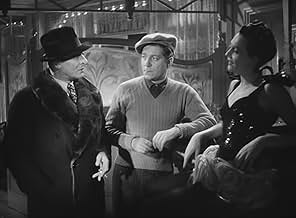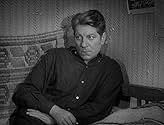AVALIAÇÃO DA IMDb
7,7/10
8,7 mil
SUA AVALIAÇÃO
Depois de cometer um homicídio, um homem se tranca em seu apartamento e rememora os eventos que o levaram ao assassinato.Depois de cometer um homicídio, um homem se tranca em seu apartamento e rememora os eventos que o levaram ao assassinato.Depois de cometer um homicídio, um homem se tranca em seu apartamento e rememora os eventos que o levaram ao assassinato.
- Direção
- Roteiristas
- Artistas
- Prêmios
- 1 indicação no total
René Génin
- Le concierge
- (as Genin)
Arthur Devère
- Mr. Gerbois
- (as Arthur Devere)
René Bergeron
- Le patron du café
- (as Bergeron)
Marcel Pérès
- Paulo
- (as Peres)
Annie Cariel
- Une locataire
- (não creditado)
Georges Douking
- L'aveugle
- (não creditado)
Georges Gosset
- Un agent
- (não creditado)
- Direção
- Roteiristas
- Elenco e equipe completos
- Produção, bilheteria e muito mais no IMDbPro
Avaliações em destaque
the main setting of "le Jour Se Leve" is the top floor of a french apartment. the film opens with Jean Gabin character Francois - a factory worker- killing a dog trainer named Valentin who we find out (as the story unravels itself) was "involved" with his girl. Francois then barricades himself from the police, and the reason for the death of Valentin is told in simple sets of flashbacks that Gabin remembers between cigarettes as he decides what his next move will be. the story is simple and delicate in manner and substance but nonetheless the director/writer team Marcel Carne and Jacques Prevert succeed in turning the realistic (and sometimes edgy) conversations, movements and places into poetry. and in response to an earlier review, the simplicity of the flashbacks, is what makes the movie so intriguing. instead of relying on a heavy plot that might challenge audience, Prevert and Carne decide to put great detail into a simple tale about a sentimental man who is torn to ruin by a contemptuous and Machiavellian man.
That was one of the last French masterpieces of the thirties just before the war.Marcel Carné was accused of pessimism and the movie was quickly forbidden by the military censorship that used to say in 1940:"if we've lost the war,blame it on "Quai des Brumes""(Carné's precedent movie.The director answered:"you do not blame a barometer for the storm"). "Le jour se lève " is,if it's possible,darker than its predecessor. From the very beginning,the hero,a good guy (Gabin) is doomed,his fate is already sealed,because the tragedy has already happened .That's why the movie is a long flashback.The memories are brought back on the screen with an astounding virtuosity by some elements of the set (the teddy bear for instance).Only three main characters outside that of Gabin,the evil one (Berry who was to play the devil in "les visiteurs du soir "1942),the lucid one (Arletty) and the ambiguous one (Jacqueline Laurent).The latter provides
the only flaw of the movie:Laurent acts Françoise as the innocent pure girl,however Carné leaves no doubt about her relations with Berry. A remake was made by Anatole Litvak with Henry Fonda ,Barbara Bel Geddes and Ann Dvorak (who must have been studying Arletty's acting for a long while),called "the long night" with an absurd happy end. Needless to say,it's the French Carné movie that you've got to see!
the only flaw of the movie:Laurent acts Françoise as the innocent pure girl,however Carné leaves no doubt about her relations with Berry. A remake was made by Anatole Litvak with Henry Fonda ,Barbara Bel Geddes and Ann Dvorak (who must have been studying Arletty's acting for a long while),called "the long night" with an absurd happy end. Needless to say,it's the French Carné movie that you've got to see!
French cinema at its best. Ideas of freedom, entrapment, isolation and realism wound into a great film which is carried by Gabin from the opening scene of the murder, through flashbacks he has remembered to the amazingly brutal final shot. Gabin and Laurent in the factory near the beginning of the movie is poetic realism at its most involving.
Carne and Prevert on a roll; hot on the heels of 'Quai des Brumes' comes this, next up will be Les Visiteurs du Soir' and THAT will be followed by 'Les Enfants du Paradis'. Get out of that, John Ford/Dudley Nichols. Where do you start with something like this, someone send a Runner for a new set of superlatives. Start with the heavy? Jules Berry, they don't come any oilier, he'd already scored in a previous Prevert script, 'Le Crime du Monsieur Lange' with Renoir on bullhorn and he used this as a warm-up for his Satan in 'Visiteurs'. Arletty? Garance-in-Waiting, 'Hotel du Nord' behind her, 'Visiteurs/Enfants' to follow. Gabin? What can I say. Even Nat Cole didn't have a trio like this. To quote the title of an earlier (1935) Gabin vehicle this was truly La Belle Equipe. How Hollywood could cast Hank Fonda in the Gabin role is beyond me. Hank, 'aw shucks' Fonda, niceness personified as decent but RUGGED Gabin? Come on, already. Vincent Price plays Jules Berry? Get real! Sandy Trauner's brilliant apartment building sets the tone here from frame #1. What an opening, Jules Berry exiting Gabin's room and running out of breath. Crowd assembling. Nowhere-To-Go Gabin holed up in his 10 by 6 reminiscing in Gitane time. Never had a chance, life's a bitch and then you die. Basically that's all there is to it. But, as someone once said, it's the way you tell them. Brilliant in spades.
Told in flashbacks, the story slowly enfolds to explain the death that started the movie. A very touching love story. The guy is just trying to find a little love in his daily struggle to work a dead end job and make ends meet. There is miscommunication between some couples. Characters are unsure about what it is they really want out of life. Events lead tragically to a death. Trapped in his room by the police, the crowd responds with varying degrees of sympathy and confusion. Was the death inevitable? Those are the questions. In the end, you understand how the situation could have ended differently. You will enjoy this movie.
Você sabia?
- CuriosidadesWhile not the first film to use dissolves to represent flashbacks, it was considered too new a method in the language of cinema that its producers' insisted on pre-title cards to avoid any confusion.
- Citações
M. Valentin: You're the type women fall in love with . . . I'm the type that interests them.
- ConexõesFeatured in Un compositeur pour le cinéma: Maurice Jaubert (1985)
Principais escolhas
Faça login para avaliar e ver a lista de recomendações personalizadas
- How long is Daybreak?Fornecido pela Alexa
Detalhes
Bilheteria
- Faturamento bruto nos EUA e Canadá
- US$ 35.321
- Fim de semana de estreia nos EUA e Canadá
- US$ 11.864
- 16 de nov. de 2014
- Faturamento bruto mundial
- US$ 35.321
- Tempo de duração
- 1 h 33 min(93 min)
- Cor
- Proporção
- 1.37 : 1
Contribua para esta página
Sugerir uma alteração ou adicionar conteúdo ausente






























